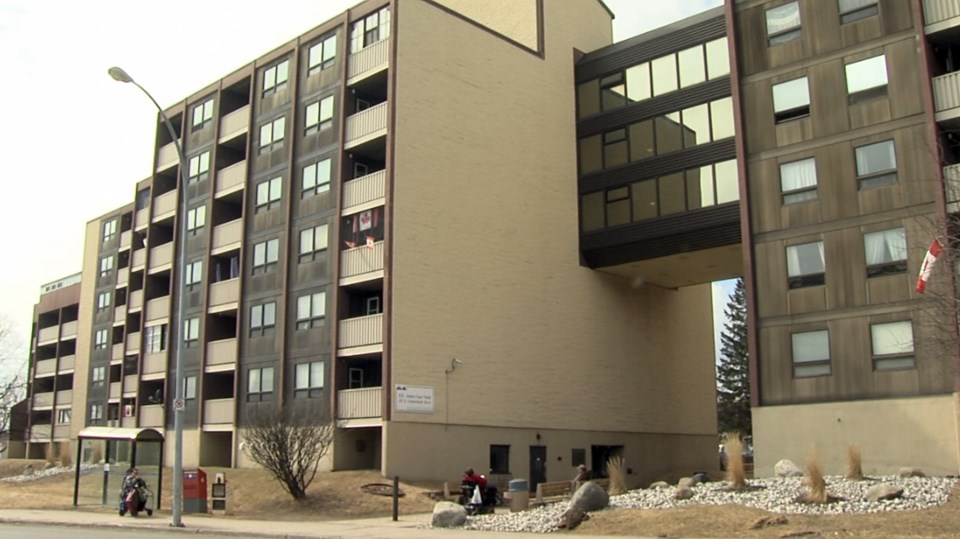THUNDER BAY — A backlog of hearings at the Ontario Landlord and Tenant Board is making it harder to evict tenants from social housing properties operated by the District of Thunder Bay Social Services Administration Board.
The social services board currently has 88 eviction applications still waiting for a hearing, plus 64 cases in adjudication, CAO Bill Bradica said on Tuesday.
In some cases, more than a year has passed since the board submitted its paperwork, and there is still no hearing date.
Private landlords across Ontario have encountered similar delays in evicting tenants for non-payment of rent, damage to property or other reasons.
In social housing projects these delays are frustrating efforts to deal with safety and security issues raised by ongoing inappropriate activity including crimes perpetrated by tenants or their associates.
"There are certain situations where tenants have caused problems, they have committed illegal acts," Bradica said. "Even when we've tried to work with them and it's gone to mediation, it's come to the point where they really are not being appropriately housed, and it comes to the point where we have to evict them."
"We have many situations like that, and when that gets backed up, it's causing more problems than we've seen in normal years...It's beyond a rent arrears situation, where it's serious behavioural issues or illegal acts."
It's why the board, he said, has advocated for years for alternative accommodation for individuals who are currently "inappropriately housed" in social housing.
"They really do need to be housed in a transitional environment with full supports on site, whether that's through the health care sector or some other sector that has the responsibility before they are then ready to live independently."
Bradica said there's a significant lack of that kind of housing in Thunder Bay.
The issue of the delays at the Landlord and Tenant Board was raised at a recent Thunder Bay District Social Services Administration Board meeting, where board members received the results of a review of physical security at its 50 housing projects in the city and district.
The review conducted by security management consultants found that the safety and security of tenants in the great majority of locations is at low risk, but half a dozen housing projects are considered to be at higher risk.
Bradica declined to disclose the locations, but said "These need more focus, and more of a coordinated focus," in terms of enhancing security.
He said the social services board treats the security and comfort of its residents as its highest priority, and wants to better address concerns that have been expressed by tenants.
One site where residents have spoken publicly about their worries is Andras Court on Cumberland Street South, which has a history of violent incidents including homicide.
In the violent situations that have occurred, the people involved knew each other
Speaking in general terms, Bradica said "I'm sure that it is unnerving to other tenants in the building when a situation like this happens."
He noted, though, that under the Residential Tenancies Act, tenants have the right to invite guests to their units.
"[In] the violent situations that have occurred, people are known to each other. As the police have told us, these are not random acts of violence."
The social services board has tried to reinforce to its tenants the need to guard against allowing non-residents access to buildings without specific permission.
But Bradica said an incident during the recent municipal election campaign showed how easily that can be circumvented, as a candidate held the door open and allowed other people to enter a building without question.
The case demonstrated the challenge posed by individuals who practise what he called "tailgating" to gain access through a door that normally requires a key fob to open.
Bradica said the board has already taken numerous steps to improve security in recent years, including installing about 1,000 cameras in its properties, improving alarm systems, and switching from keys to key fobs.
But the consultants' report, which was presented to the board in a closed meeting last week, outlines a variety of new measures that would cost upwards of $500,000 to implement.
Recommendations include the strengthening of access control measures, additional mobile security patrols, enhanced alarm monitoring and enhanced alarm response.
Consideration will also be given to improving the appearance of some of the properties to make them look "more desirable and less like social housing," Bradica said.
He said the social services board hopes, as well, to have more community partners come on-site to provide services and programming including addiction and mental health counselling, and supports for children.
"That was noted by the consultants as having a positive impact at a number of properties. So we'd like to do more of that, especially at some of the buildings considered at higher risk."
The recommendations will be submitted to the incoming board in the new year for budget consideration.
